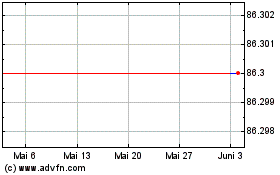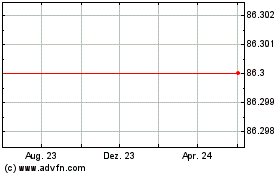Japan Stocks Rise; Nikkei Off More Than 5% for Week
17 Juni 2016 - 6:10AM
Dow Jones News
Stocks in Japan rose from a four-month low and were leading most
Asian markets higher on Friday, although worries about a coming
U.K. vote on European Union membership have left the region's
markets badly bruised.
The Nikkei Stock Average was recently up 1.2%, the Hang Seng
Index gained 0.9% and the Shanghai Composite Index was up 0.7%.
Australia's S&P ASX 200 was roughly flat.
Week-to-date, the Nikkei Stock Average is off 5.7%, on track for
its worst performance since the week ended Feb. 12. Hong Kong is
headed down 4% while the Shanghai is on track to lose more than
1%.
Some investors appear willing to buy shares after several days
of declines, which made for a resilient market Friday.
A recovery began overnight, as U.S. stocks climbed and snapped a
five-session streak of declines. The market started the day lower
after the Bank of Japan dashed hopes for additional monetary
easing, amid concerns about the impact of a coming U.K. vote on
whether to remain in the European Union. But official campaigning
ahead of the referendum was halted Thursday after an attacker
killed a lawmaker from the U.K.'s Labour Party.
The S&P 500 gained 0.3% by Thursday's close.
In Asia, analysts pointed to the closeness of polls tracking the
EU membership vote and the possibility of a market rebound should
the U.K. choose to remain in the bloc when it votes on June 23.
"The initial market turmoil created by a "Brexit" vote may be
both smaller and shorter-lived than many fear," wrote Julian
Jessop, an economist at Capital Economics. "Markets are already
positioned for a sharp fall in the pound against the dollar, which
leave plenty of room for a burst of short-covering."
In Japan, shares closed Thursday at their second lowest point
this year, but were rebounding as the Japanese yen reversed its
strengthening trend.
The yen recently weakened by 0.1% against the U.S. dollar to
104.62 yen per dollar.
Investors are watching the yen closely—the currency traded as
weak as ¥ 103.58 to the dollar during Asian hours Thursday, and
many analysts think that a fall below that level raises the
likelihood that the Bank of Japan will intervene. Now trading near
a two-year high, the stronger yen has been has become a major
headache for the central bank because it restrains efforts to stoke
inflation and spark growth, while making Japanese exports less
competitive abroad.
"It might have made a sense for them to hold off," Nicholas
Ferres, portfolio manager for global asset allocation at Eastspring
Investments, said of the BOJ's announcement to hold off on further
easing Thursday afternoon. "They have a few bullets left in the
barrel or ammunition if they need to use it over coming weeks."
The Nikkei is off about 18% since the beginning of the year, but
Mr. Ferres said his team is overweight on Japanese equities.
Kosaku Narioka and Takashi Nakamichi contributed to this
article.
Write to Chao Deng at Chao.Deng@wsj.com
(END) Dow Jones Newswires
June 16, 2016 23:55 ET (03:55 GMT)
Copyright (c) 2016 Dow Jones & Company, Inc.
ASX (ASX:ASXCD)
Historical Stock Chart
Von Apr 2024 bis Mai 2024

ASX (ASX:ASXCD)
Historical Stock Chart
Von Mai 2023 bis Mai 2024
